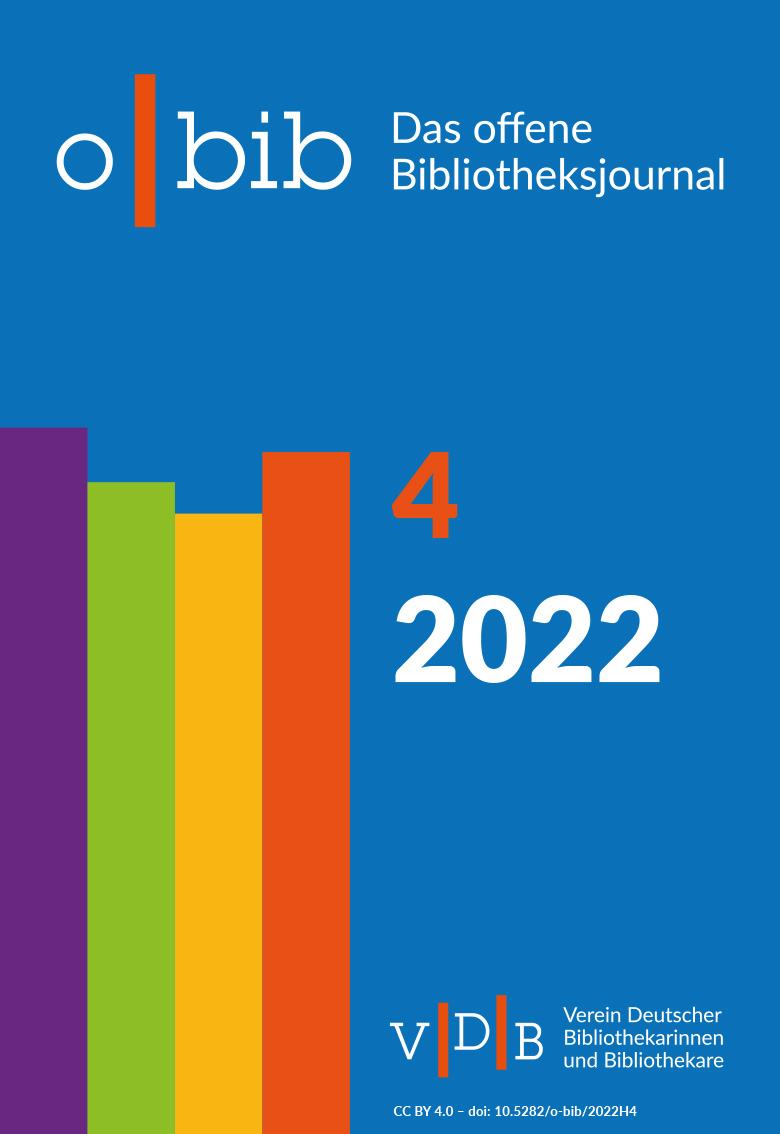Der Kitodo Entwicklungsfonds
Open Source Softwareentwicklung kooperativ finanzieren und gestalten
DOI:
https://doi.org/10.5282/o-bib/5845Schlagwörter:
Open Source Software, Nachhaltige Softwareentwicklung, Kitodo, Digitalisierung, EntwicklungsfondsAbstract
Open-Source-Software ist von Alterungsprozessen bedroht, die ohne eine bewusste Steuerung die Nachhaltigkeit der Software gefährden. Dieser Beitrag stellt den Kitodo-Entwicklungsfonds als Lösungsansatz vor, diesem Alterungsprozess kontinuierlich zu begegnen. Kitodo ist dreierlei – eine verbreitete Open-Source-Lösung zur Produktion und Präsentation digitaler Objekte, eine Community und ein gemeinnütziger Verein. Kitodo.Production ist das Workflowmanagementmodul der Kitodo-Suite, dass in Deutschland in mehr als 50 Institutionen eingesetzt wird. Der Entwicklungsfonds stellt ein Modell dar, wie Verein und Community gemeinsam erfolgreich eine Finanzierung und Steuerungsprozesse zur Lösung zur Vermeidung der Überalterungsgefahr etabliert haben.
Literaturhinweise
Bonte, Achim: Chancen und Fallstricke offener, kooperativer Softwareentwicklung. Das Beispiel Kitodo, in: Bonte, Achim; Rehnolt, Juliane (Hg.): Kooperative Informationsinfrastrukturen als Chance und Herausforderung, Berlin 2018, S. 182–192. Online: https://doi.org/10.1515/9783110587524-022.
Brügge, Bernd; Harhoff, Dietmar; Picot, Arnold u.a.: Open-Source-Software. Eine ökonomische und technische Analyse, Berlin 2004 (Springer eBook Collection Business and Economics). Online: https://doi.org/10.1007/978-3-642-17024-9.
Coad, Peter; Lefebvre, Eric; DeLuca, Jeff: Java modeling in color with UML. Enterprise components and process; enrich the content of your models, become a better modeler by example, deliver frequent, tangible, working results, Upper Saddle River, NJ 1999.
Finck, Matthias; Hermann, Elena (Hg.): Abschlussbericht Kooperative Weiterentwicklung der quelloffenen Digitalisierungssoftware Kitodo.Production, Elmshorn 2019. Online: https://doi.org/10.5281/zenodo.6779479.
Finck, Matthias: Usability-Engineering in der Open-Source-Softwareentwicklung, Zugl.: Hamburg, Univ., Diss., 2007, Sierke, Göttingen 2007.
Hars, Alexander, & Ou, Shaosong (2002). Working for Free? Motivations for Participating in Open-Source Projects, in: International Journal of Electronic Commerce 6 (3), 2002, S. 25–39. Online: http://www.jstor.org/stable/27751021.
Hippel, Eric von; Krogh, Georg von: Open Source Software and the “Private-Collective” Innovation Model. Issues for Organization Science, in: Organization Science 14 (2), 2003, S. 209– 223. Online: https://doi.org/10.1287/orsc.14.2.209.14992.
Huber, Kathrin; Strötgen, Robert: Und nun? Der Weg vom Projekt zur kontinuierlichen Produktentwicklung, in: Finck, Matthias; Hermann, Elena (Hg.): Abschlussbericht Kooperative Weiterentwicklung der quelloffenen Digitalisierungssoftware Kitodo.Production, Elmshorn 2019, S. 72–80. Online: https://doi.org/10.5281/zenodo.6779479.
Meyer, Sebastian; Huber, Kathrin: Konsequent Modular. Ein offenes, modernes Architekturkonzept, in: Finck, Matthias; Hermann, Elena (Hg.): Abschlussbericht Kooperative Weiterentwicklung der quelloffenen Digitalisierungssoftware Kitodo.Production, Elmshorn 2019, S. 40–49. Online: https://doi.org/10.5281/zenodo.6779479.
Vassallo, Carmine; Grano, Giovanni; Palomba, Fabio u. a.: A large-scale empirical exploration on refactoring activities in open source software projects, in: Science of Computer Programming 180, 2019, S. 1–15. Online: https://doi.org/10.1016/j.scico.2019.05.002.
Wolf, Henning; Bleek, Wolf-Gideon: Agile Softwareentwicklung. Werte, Konzepte und Methoden, Heidelberg 2011.
Veröffentlicht
Ausgabe
Rubrik
Lizenz
Copyright (c) 2022 Robert Strötgen, Matthias Finck

Dieses Werk steht unter der Lizenz Creative Commons Namensnennung 4.0 International.





